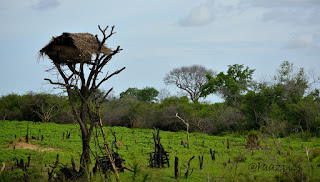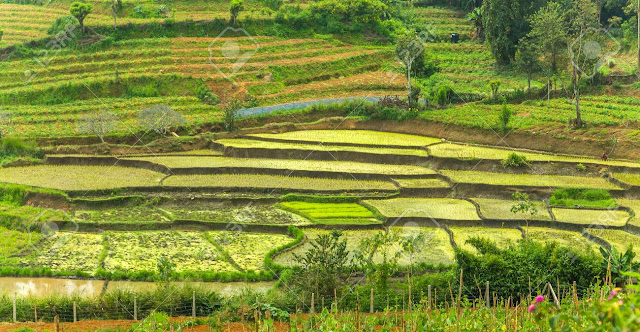| Add caption |
| Add caption |
| Add caption |
Field Visit 01
Morning Session:
Makandura Mixed Cropping System
Makandura Research Station (MRS), Makandura (Kurunegala District, NWP)
Established in 1983 for conducting field experiments and demonstrating agroforestry model
| Add caption |
| Add caption |
| Add caption |
Total extent: 58.20 ha
Agroclimatic zone: Intermediate zone low country (IL1a)
| Add caption |
| Add caption |
| Add caption |
Cultivation of pineapple in coconut land
in popular in Colombo, Gampaha, Kurunegala, and in some areas Puttalam
Districts. Well drained gravel or sandy loam soil are suitable for
pineapple cultivation.
| Recommended varieties | ||||
| Murisi | ||||
| Kew | ||||
| Planting systems | ||||
| Single row system | ||||
| Suitable for Murisi variety | ||||
| Number of suckers required- 8400 per ha | ||||
| Double row system required- 3500 per ac | ||||
| Number of suckers required – 12000 per ha (5000 per ac) | ||||
| Multiple row system | ||||
| Number of suckers required -24000 per ha (10,000 per ac) | ||||
| Fertilizer application | ||||
| N, P, K: 11-7-31 mixture is recommended for pineapple. | ||||
| To prepare 100 Kg of the mixture; | ||||
| Urea (40%N) | -24.0 Kg | |||
| Rock Phosphate | -25.0 Kg | |||
| Muriate of Potash | -51.0 Kg | |||
| Keiserite (24% MgO) | 1 parts by weight | |||
2nd and afterwards: Every 3-4 months, apply the above dose
Banana as an intercrop in coconut lands
Banana is a very common intercrop
cultivated in wet and intermediate zones. Banana could also be
cultivated in dry areas with irrigation.
| Recommended Banana varieties | ||
| Ambul | for wet zone | |
| Anamalu | ||
| Kolikuttu | for dry and intermediate zones | |
| Ash Plantain | ||
| Mondam | cooking purposes (for wet zone) | |
| Atemaru | ||
| Planting systems | ||
| In mature coconut lands | ||
| Two rows of Kolikuttu in one avenue of coconut. | ||
| One row of Ambull in one avenue of coconut. | ||
| New/replanting of coconut (up to 5 years) | ||
| Fertilizer application | ||
| Should be applied after two months from planting and after wards at four monthly intervals. | ||
| g/plant (wet zone) | g/plant (Intermediate zone/Dry zone) | |
| Urea | 110 | 120 |
| Rock Phosphate | 150 | - |
| Concentrated Super Phosphate | - | 80 |
| Muriate of Potash | 190 | 250 |
| Total | 450 | 450 |
Coffee as an inter-crop in coconut lands
Coffee could also be cultivated as a
profitable intercrop in coconut lands in wet and intermediate areas.
Coconut plantations between the age of 15 – 45 years provides required
shade condition for coffee.
| Recommended Coffee varieties | |||
| “Katimor” variety | |||
| The Robusta varieties (GCR, CC-1, C-111) | |||
| System of planting | |||
| Double row system | |||
| Two rows of Coffee 6’ x 6 apart are planted between two rows of coconut. | |||
| Single row system | |||
| One row of Cocoa is planted in the centre of two rows of coconut at a distance of 8 feet within the row. | |||
| Fertilizer application | |||
| Urea (40%N) | -4 parts by weight | ||
| Saphos Phosphate (28% P2O5) | -5 parts by weight | ||
| Muriate of Potash (60% K2O) | -3 parts by weight | ||
| Keiserite (24% MgO) | -1 parts by weight | ||
Cocoa as an inter-crop in coconut lands
Cocoa can be cultivated successfully in
coconuts in wet and intermediate areas. Experiments have shown an
increase of coconut yield in cocoa intercropped lands. Soil properties
of these are enhanced by adding a large quantity of leaf titter. Age of
the coconut plantation should be 15- 45 years.
| Recommended cocoa varieties | ||
| Local variety – Millawana | ||
| NA-32 | ||
| Forestero group varieties | ||
| System of planting | ||
| Double row system | ||
| Two rows of Cocoa are planted in 8’x 10’ apart between two rows of coconut. | ||
| Single row system | ||
| One row of Cocoa is planted in the centre of two rows of coconut at a distance of 8 feet within the row. | ||
Field Visit 01
Afternoon Session:
Kalpitiya Intensive Cropping System
During an earlier era the
Kalpitiya area was famous for its production of dried fish.
However today, the area despite its sandy soil and
arid climatic condition, is better known for its production of fruits
and vegetables.
This
unbelievable change is solely due to the untiring efforts of the farming
community who have transformed the once arid area into a lush orchard.
Around 8,000 families live in the area extending
from Mampuri to Thalawila via Ethalai, Norochcholai, Kalkudah and
Senapola. Today an extent of 2,500 hectares are covered with vegetable
cultivation while another 300 hectares are cultivated with a variety of
fruits.
According to farmers the agricultural development in the
area has led to the creation of around 30,000 job opportunities.
The economic centre at Norochcholai has proved a
boon to the farmers as they are able to dispose of their products at
the centre.
Around 100
tons of vegetable are said to be traded on a daily basis with buyers
from all over the country patronizing the centre.
However farmers complain that despite their best
efforts, they receive no help from the state.





Good content and thanks for sharing with us.
ReplyDeleteSustainable development
Land clearing is an essential service for property owners in Austin. Whether you're looking to clear land for construction or remove trees and brush for fire prevention, it's important to have a reliable and experienced team on your side. That's where Land Clearing Austin comes in.
ReplyDeleteOur team of experts has years of experience providing top-quality land clearing services to customers throughout Austin and the surrounding areas. We use state-of-the-art equipment and techniques to ensure that your land is cleared quickly, efficiently, and safely.
Thank you for sharing such an informative blog! It’s highly valuable for farmers and other audiences. NACL Industries Ltd in India is a leading agrochemical company committed to sustainable agriculture while also prioritizing environmental health. Agrochemicals
ReplyDeleteCultivate your knowledge at Agriculture Expo 2025. Experience live demos, expert speakers, and the latest in agricultural advancements.
ReplyDeleteget farming site land managed farms near bangalore
ReplyDeletecontact for buying farming land managed farms near bangalore
ReplyDeletemanaged farmland investment with Misty Valley farms
ReplyDeletemanaged farmland investment
ReplyDeleteTruly inspiring! It’s amazing how the farmers of Kalpitiya transformed dry land into a thriving hub of fruits and vegetables.
ReplyDeleteTractor Price
Bull India is a leading manufacturer of Backhoe Loaders, Skid Steer Loaders, and Tractor Attachments. Our machines rival global brands like JCB Backhoe Loader and JCB Machine in performance and durability. Built for Indian conditions, Bull delivers power, precision, and reliability. Choose Bull India – trusted for innovation in every load and lift.
ReplyDeletebackhoe loader | skid steer loader | tractor attachment | jcb backhoe loader | jcb machine
The cost of a **[JCB machine][1]** may seem high, but it reflects its performance, durability, and long-term value.
ReplyDeleteAt Bull India, we offer competitively priced JCB machines suited for different construction needs.
Investing in a reliable **[jcb machine][1]** helps reduce maintenance costs and improves work efficiency.
Bull India also supports customers with flexible options and dependable after-sales service.
[1]: https://bullindia.com/